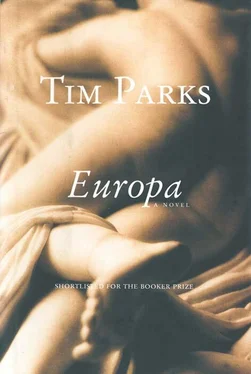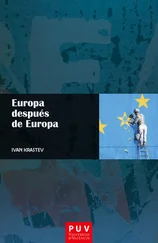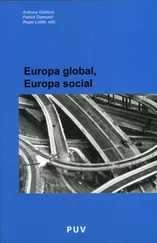Tim Parks - Europa
Здесь есть возможность читать онлайн «Tim Parks - Europa» весь текст электронной книги совершенно бесплатно (целиком полную версию без сокращений). В некоторых случаях можно слушать аудио, скачать через торрент в формате fb2 и присутствует краткое содержание. Год выпуска: 1999, Издательство: Arcade Publishing, Жанр: Современная проза, на английском языке. Описание произведения, (предисловие) а так же отзывы посетителей доступны на портале библиотеки ЛибКат.
- Название:Europa
- Автор:
- Издательство:Arcade Publishing
- Жанр:
- Год:1999
- ISBN:нет данных
- Рейтинг книги:3 / 5. Голосов: 1
-
Избранное:Добавить в избранное
- Отзывы:
-
Ваша оценка:
- 60
- 1
- 2
- 3
- 4
- 5
Europa: краткое содержание, описание и аннотация
Предлагаем к чтению аннотацию, описание, краткое содержание или предисловие (зависит от того, что написал сам автор книги «Europa»). Если вы не нашли необходимую информацию о книге — напишите в комментариях, мы постараемся отыскать её.
Europa — читать онлайн бесплатно полную книгу (весь текст) целиком
Ниже представлен текст книги, разбитый по страницам. Система сохранения места последней прочитанной страницы, позволяет с удобством читать онлайн бесплатно книгу «Europa», без необходимости каждый раз заново искать на чём Вы остановились. Поставьте закладку, и сможете в любой момент перейти на страницу, на которой закончили чтение.
Интервал:
Закладка:
Yes, we had to be forever in love, I remember now, my wife and I, so that one had the feeling of something that had solidified, terribly, an awful process of fossilization, a shell one had made for oneself, but that somehow wasn’t the right shape any more, wasn’t appropriate any more. Again it was a question of propriety, I tell myself, sitting beside Doris Rohr. And perhaps this was why she and Suzanne, our daughter, could never really get on together, because Suzanne would insist on growing up, on not staying the same, and hence was a constant reminder to us that we were not the same either, offering as she did that yardstick of age and of all its attendant transformations in the flesh which children must offer and parents must take note of.
I wanted to have a word with Suzanne, I said.
Her birthday’s tomorrow, my wife said drily.
I told my wife I was perfectly aware my daughter’s birthday was tomorrow, but even as! said this I would have liked to have added something to ease this studied and obvious unpleasantness, because it is unthinkable really that two people should live together for nigh on twenty years and then have nothing more than their mutual irritation to trade on the telephone, unthinkable, but apparently the norm, or almost (when things are not worse), and sitting here on the blood-red upholstery of this hideous modern coach, where six video screens have just been lowered in perfect simultaneity from wells fixed in strategic positions in the overhead luggage racks, and where Doris Rohr is offering me an expensive chocolate, her mauve nails turning the pages of Marie Claire , sitting here thinking of that phone-call to my wife conducted in the freezing entrance to the predictably and it has to be said depressingly designed Chambersee Service Station while watching for sneaky young Nicoletta to come out of the loo, and, from the corner of my eye then, seeing her come in from the coach and head off up the stairs to the cafeteria, perhaps the only woman on the trip to be wearing a skirt as depicted by the stylized sign, so that even from the phone-booth I could see the achingly slim calves black-stockinged above high heels scraping the stone steps like so many matches struck on sandpaper — sitting here in the coach, my mind prey, as it has been for so long, to every passing thought, but somehow not only the prey but the aggressor too, or a prey to its own aggression, self-consuming — sitting here in this parlous psychological state, it once again, I mean as a result of this phone-call, strikes home to me how much I have lost: my role as father and husband, the obviousness of my old life, the simplicity of being somebody’s husband, somebody’s father, the readiness of an explanation when required, being able to say, This is who I am and what I do. So that as the video two seats in front of me begins to glow and one or two people pull pink curtains against the rain outside to make the screen more vivid, it occurs to me that if I lose my job as well as everything else, this job that I always saw as a mere stepping-stone, a sensible way-station, an income to tide me over while I picked up my ticket to somewhere else (until, like my marriage, it became a desert island, a place of loathed and ultimately terrifying convenience), if I lose my job, I will have lost the last element in life, after wife and daughter and mistress, that gave me any sense of role and identity. And I begin to think, for the first time, that perhaps this trip was not a mistake after all. Perhaps it isn’t a mistake, I tell myself. Perhaps I should take it seriously and work hard at it alongside the others, lobbying Euro-MPs and talking to the press and generally making every reasonable and democratic effort to save this last attachment I have to the common-sense world of role and identity and usefulness and source of income — myself as paid language teacher at the University of Milan — You should take this trip seriously, I tell myself, very seriously, and stop pretending to be so superior to crazy Vikram with his drink and his dog and his victim politics, and dull Doris with her chocolates and magazines, and dour irritable Dimitra with her square-jawed determination to keep her place on the gravy train. You are arrogant, I tell myself. You are irretrievably arrogant. You are obsessed by the notion that you are somehow superior to every task you have been allotted and every person you have shared your life with. This has to stop, I told myself. You have to stop.
But then the words gravy train remind me that I had vowed I would leave this job, which is a pointless and soul-destroying job. You have been doing the same job year in year out for fifteen years now, I tell myself, staring at titles on a video screen as Doris Rohr pops another chocolate in her elegantly made-up mouth. You have gone on and on doing exactly the same thing, teaching huge groups of students who are never the same from one week to the next and with whom one has no contact at all and who are only interested in passing their exams, punching their meal-tickets. Indeed many of the students on this bus, I tell myself, to whom you were no doubt hasty in your attribution of altruistic impulses, are perhaps hoping that their faces will be remembered by the foreign lectors, ourselves, and that they will thus get better grades in their oral exams. For having come on this trip. For having lent their support. For years and years, I tell myself, suddenly extremely anxious, you have gone on and on teaching students interested in nothing more than the acquisition of a convenient piece of paper, a convenient passe-partout , students with no interest at all in English, all the while nourishing, cherishing, defending, the initial illusion that you were somehow transmitting culture to these people. This has to stop, I tell myself, refusing Doris Rohr’s offer of a Walnut Whirl. I should never have taken this job at all. Or never have stayed there for more than a year or two. Then reaching this conclusion, and terribly aware that only a moment ago I had reached the exact opposite conclusion , I am appalled at my own vacillation, at my loss of direction and purpose, as this whole trip, I’m obliged to observe, has been a terrible loss of direction for me, a deep lesion in the identity and resolve I had so carefully been constructing, reconstructing, in my little flat with all the new personal items and objects I had slowly been accumulating, to wit my wallet with its purpose-cut spaces for an Italian identity card, an Italian driving licence, my keyring, purchased in heavy snow from a Moroccan on Via Manzoni, which has a little leather pouch the perfect size for a Johnnie (it is presently loaded), my new leather jacket to replace the one she helped me buy, my new music collection, after I threw out the old with all the French singers she taught me to listen to and all the sixties music I rediscovered — yes, I’m appalled, appalled by the idea of being in my job for the rest of my life, and equally appalled by the idea of losing my job and being alone with nothing whatsoever to do or be for the rest of my life — I hate the expression ‘therest of my life' — and without of course, it occurs to me now, a ready supply of young women, which has been, as I said before, together with screen-based computer games and biliards and arguments about politics, an important solace for me over the last two years. But above all I’m appalled by my lack of resolve, by my not knowing what, even if I knew how, I should do. I’m appalled by my constantly being appalled.
Suzanne was out, my wife said. I could get in touch with her this afternoon.
Okay
But then although these credit-card calls are expensive and I really had nothing to say, I made a conscious decision to stay on the phone to my wife for a moment or two longer, partly because Sneaky Nicoletta was not out of the loo yet and partly because she had barely reached the top of the stairs and I did not want to give her the impression that I was still at the stage of hurrying off phones to follow her about and thus still dangerous, although of course I’m perfectly aware that I came on this trip for no other reason than to follow her about, and it may even be that I am still dangerous, something I can hardly deny having been. Indeed, if there is one legitimate, or at least convincing thought in my mind on those occasions when I stand by the phone thinking, Now I am going to call her, now I can’t stop myself calling her (so that my finger will begin to punch, or until very recently, the buttons 045), it is the desire to show, in the course of a light and relaxed conversation, that Í am no longer dangerous and that I deeply regret having been so, the desire to end the affair well (when in fact it ended long ago and badly). And if I have learnt not to pick up the receiver on those occasions, or at least to stop dialling after the five, it is because bitter experience has taught me that the longer I go on talking the more violent and outraged I will become, the more dangerous I will show myself to be. How could she say that nothing had really happened, she who had previously insisted to me how important it was to have things happen in life? Make something happen, she said. She put the knife to my throat. It takes more than a kiss to cut yourself free, she said.
Читать дальшеИнтервал:
Закладка:
Похожие книги на «Europa»
Представляем Вашему вниманию похожие книги на «Europa» списком для выбора. Мы отобрали схожую по названию и смыслу литературу в надежде предоставить читателям больше вариантов отыскать новые, интересные, ещё непрочитанные произведения.
Обсуждение, отзывы о книге «Europa» и просто собственные мнения читателей. Оставьте ваши комментарии, напишите, что Вы думаете о произведении, его смысле или главных героях. Укажите что конкретно понравилось, а что нет, и почему Вы так считаете.












